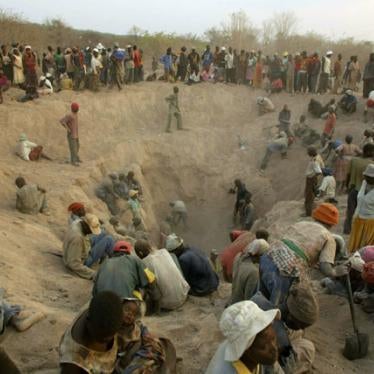They might end up as costly baubles on sale in shops around the world. But for some diamonds mined in Zimbabwe, the journey begins in massive illegal pit mines where men, women, and children are forced to work long days under the brutal authority of government troops, who took over the mine in a spree of bloodshed.
"For two weeks in January 2009, I worked in the diamond fields together with several other children to carry sacks of diamond ore from the field and to fetch water to sieve the ore," a 13-year-old girl told Human Rights Watch. "I was too afraid to run away. Every day, I would carry ore and only rest for short periods when the men were digging. We always started work very early in the morning before 8 and finished when it was dark, after 6. All I want now is to go back to school."
Her story - and many others - of abuse and forced labor are recounted in a new report from Human Rights Watch. It outlines how control of the Marange diamond fields was handed over to the military by the previous government, which was run by the Zimbabwe African National Union-Patriotic Front (ZANU-PF). Since February 2009, ZANU-PF has shared government power, but the military remains under its control.
The report, "Diamonds in the Rough," also suggests that revenue from the gems enriches senior ZANU-PF officials and provides significant revenue to the Reserve Bank of Zimbabwe, which has underwritten some military operations. The Marange fields could potentially yield US$1.2 billion a year, according to one estimate, at a time when the country is broke, unable even to pay its teachers or for basic sanitation and health care, and begging the world for aid. The two other Zimbabwe diamond sites are deep mines run by private commercial enterprises.
After the Marange fields were discovered in 2006, they were open to anyone, and illegal mining and smuggling flourished. The army took control in October 2008 with an unrestrained assault, witnesses said. Troops in helicopters fired tear gas and machine guns at unarmed miners. Soldiers overran the fields and nearby villages. According to several villagers, they fired their AK-47 assault rifles indiscriminately, without warning. Over a three-week operation, more than 200 civilians were killed.
Since then, diamond mining - and smuggling - remain in the grip of the armed forces. The worst of the violence has ended, but Human Rights Watch found that the army continues to commit human rights violations, including beatings, torture, forced labor, and child labor in Marange.
"Zimbabwe's new government should immediately end all human rights abuses in the Marange diamond fields and remove the army from the area," said Georgette Gagnon, Africa director at Human Rights Watch. "All soldiers and police officers responsible for horrific abuses must be held to account." The report also calls for a worldwide ban on diamonds from the Marange fields.
"Diamonds in the Rough" is based on two research missions to Zimbabwe in February 2009. Human Rights Watch researchers visited Harare, Mutare, and the Marange fields and interviewed more than 100 people - witnesses, local miners, local court officials, local community leaders, victims and relatives, lawyers, medical staff, soldiers, police, traditional leaders, and local human rights activists.
Fact File
The military's violent takeover of the Marange diamond fields, discovered by villagers in 2006, occurred one month after ZANU-PF agreed to share power with the Movement for Democratic Change, the opposition party that won the March 2008 elections. The actual entry of the MDC into government did not take place until February 2009.
Some children in the Marange fields work up to 11 hours per day with no pay.
A local lawyer estimates that up to 300 children continue to work for soldiers in the diamond fields.
Chief Recommendations
To the Government of Zimbabwe
- Immediately end all human rights abuses in the Marange diamond fields, including killings, beatings, forced labor, child labor, and torture.
- Remove the army from the Marange district, demilitarize the diamond industry, and restore security responsibilities to the police, but ensure that they abide by international law enforcement standards governing use of lethal force and illegal searches.
- Begin an impartial and independent investigation into alleged human rights abuses, smuggling of diamonds, and corruption.
- End diamond smuggling, urgently resolve the outstanding legal questions of control and title to the Marange diamond fields, and ensure that only licensed miners are permitted to mine and that all buyers of diamonds are properly licensed in compliance with the requirements of the Kimberley Process Certification Scheme.
To the Kimberley Process Certification Scheme
- Immediately investigate allegations of serious human rights abuses and smuggling of Marange diamonds outside Zimbabwe and any other violations of the Kimberley Process.
- Immediately suspend Zimbabwe from participation in the KPCS until it satisfactorily addresses the violations set out in the report and puts in place genuinely effective and transparent measures to regulate its diamond industry and stop human rights abuses, and end smuggling.
- Urgently review and broaden the definition of "conflict diamonds" or "blood diamonds" to include diamonds mined in the context of serious and systematic human rights abuses.
To States and Organizations that Are Major Consumers of Rough Diamonds
- Support initiatives to speedily reform and broaden the mandate of the KPCS to include human rights concerns at the core of its mandate.
- Guard against the purchase of rough diamonds from Marange and exercise greater vigilance through the use of the KPCS "footprint" of Marange diamonds, which enables buyers to identify diamonds originating from Marange more easily.
- Take steps to inform consumers of polished diamonds that they should not buy, trade, or sell diamonds originating in Marange.







